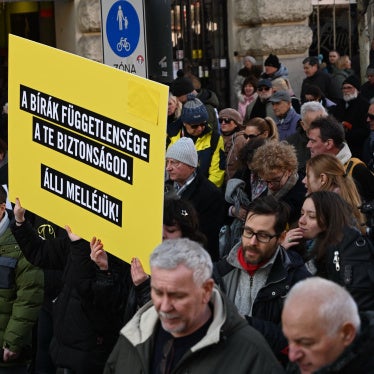The European Union should press for concrete improvements in human rights when it meets with senior Kazakh and Kyrgyz officials this week, Human Rights Watch said today.
The July 22 Cooperation Council meetings constitute the single most important bilateral encounters of the year between the EU and Kazakhstan, and between the EU and Kyrgyzstan. They shape the EU’s engagement with its Central Asian partners, under the framework of its Partnership and Cooperation Agreements with Kazakhstan and Kyrgyzstan.
Both Kazakhstan and Kyrgyzstan have consistently flouted the human rights criteria in their Partnership and Cooperation Agreements with the EU, Human Rights Watch said.
In a letter sent to EU foreign ministers in advance of the meetings, Human Rights Watch urged the EU to seek concrete commitments from the two governments to improve their poor human rights records.
“These meetings are the EU’s chance to get concrete results from its Central Asian partners,” said Elizabeth Andersen, executive director of Human Rights Watch’s Europe and Central Asia division. “If the EU agrees to dialogue without tangible progress, that could actually undermine efforts toward human rights and democracy in these countries.”
Basic rights protection has deteriorated dramatically in both Kyrgyzstan and Kazakhstan during the past year. Recent Human Rights Watch investigations found that both governments have repressed political opposition, silenced independent media, and resisted international efforts to promote reform.
“As preparations for the Cooperation Council meetings proceed, political pluralism and freedom of expression in these countries are eroding,” said Andersen. “Now is the time to reverse these negative trends.”
Human Rights Watch urged the EU to use the upcoming meetings to insist on the following specific steps:
- Release from prison Kazakh political opposition leader Galimzhan Zhakianov, Kazakh journalist Sergei Duvanov, and Kyrgyz political opposition leader Feliks Kulov, all of whom are being held on charges that appear to be politically motivated;
- Allow for an independent and impartial review of all criminal cases brought against members of the political opposition;
- Rescind criminal defamation laws, including those that currently allow government officials to bring claims of insult to “honor and dignity” when they are called to account for corruption and abuse of office;
- In the case of Kazakhstan, agree on a firm deadline for registration of opposition political parties;
- In the case of Kazakhstan, sign and ratify the International Covenant on Civil and Political Rights and the International Covenant on Economic, Social and Cultural Rights. Both governments should also be urged to follow the EU’s example to issue standing invitations to all U.N. human rights monitors.
- In the case of Kyrgyzstan, allow an international investigation into the use of lethal force by police against demonstrators in March 2002; despite apparent indications of progress last year, those who shot and killed five demonstrators have not been brought to justice for that crime.
Human Rights Watch also recommended that the EU coordinate its Central Asia policy closely with other governments and organizations active in the region, including the United States and the Organization for Security and Cooperation in Europe (OSCE). One example of such cooperation would be for the EU to enlist former Finnish President Martti Ahtisaari, the OSCE’s special envoy to Central Asia, to track specific steps taken by the Kazakh and Kyrgyz governments to bring themselves into compliance with the human rights requirements of the Partnership and Cooperation Agreements.
“The EU has used strong words in the past to acknowledge the abuse taking place in Central Asia,” said Andersen. “Now it needs to take the next step, to insist on concrete measures to roll back this latest wave of abuse.”







